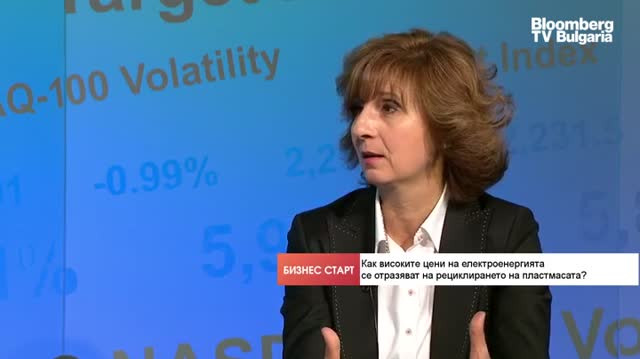Tsvetanka Todorova, Chairwoman of the Board of Branch Association Polymers, in "Business Start", 18.01.2022
There is not enough plastic, suitable as technical characteristics for recycling and use in new products. This was said by Tsvetanka Todorova, Chairwoman of the Board of the Branch Association Polymers (BAP), in an interview for Bloomberg TV Bulgaria. "There must be a sufficient amount of plastic waste, which is related to separate collection with the provision of sufficiently clean waste streams."
"Furthermore, there is still no standard adopted at European level for so-called recyclates. What exists as requirements and standards for primary polymers has not yet been done for secondary polymers."
This year, the jump in the price of electricity is becoming a huge problem for the industry, Todorova warned. "The polymer processing and recycling industry is a high-energy sector. The price of electricity in the total share of finished products is 20-30%" and the drastic increase in electricity has a direct impact on the cost of production, and consumers cannot afford all this increase. On the other hand, producers have long-term contracts that they cannot perform without incurring losses.
"It gets to the point where companies monitor electricity prices and decide whether to work today or not so they don't make losses." This is really happening, confirmed the guest and stressed that such stops are also not painless for this type of production and "purely technological losses."
Compensation for business is not enough and there must be a longer-term vision and measures to make business predictable. The association's proposal, which has so far gone unanswered, is for energy-intensive companies to buy electricity directly from nuclear power plants so that the industry can operate, she said.
Regarding the idea of vending machines for collecting empty plastic bottles, the guest said: "The idea is not new to us ... In fact, what is valuable for us is that clean materials will be collected and then recycled. This would increase a lot the purity of the raw materials, which will then be processed and used in production". "They should invest in retail outlets, which will lead to problems for smaller stores, although in many countries in Europe this system works. This is the trend and it is inevitable that sooner or later this will happen in our country."
How does the European directive on limiting the impact of certain plastic products on the environment that has entered into force affect the industry? Why is control over its implementation extremely important? Are companies investing in new technologies and equipment to meet the new requirements? Is state support needed and what is needed for the enterprises in the sector to survive? Is there and can there be a plant for biodegradable polymers in Bulgaria? What will be the demands of the association and the industry as a whole at the upcoming meeting with the government? What is the logic of private companies such as Coca Cola, PepsiCo, Nestle, Danone, IKEA to call for a global agreement to limit plastic production? Is it possible for the vending machine initiative to be implemented through public-private partnerships? What are the best practices in this direction?






